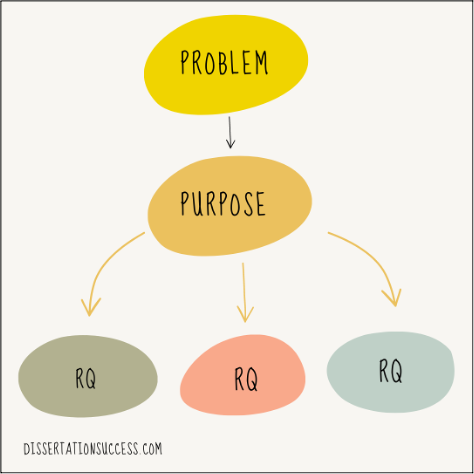Learning how to develop research questions is a big step in designing your research study and forces you to think about what you want to know as you gather data from your participants. No longer is the topic you’ve selected just a hypothetical issue you’re interested in addressing; once you have written the research questions, you realize that you must explain to the reader exactly what it is that you want to know at the end of your research. However, I often talk with dissertation writers who are confused with the difference between research questions and interview questions. Or, I will be reviewing draft interview questions for a client and come across questions that are much more suited for interview questions.
What, then, is the difference between research questions and interview questions? In short, research questions are questions you want to answer by completing your study. Interview questions are questions you ask of your participants to help you address your research questions. Sounds like circular logic, doesn’t it? Let’s dig a little deeper.
The need for interview questions is self-evident: you have participants and so you need to ask them questions in a qualitative study in order to collect data. So, why do you need research questions? Research questions are the pillars of your study: those key concepts you want to explore so that you can address the gap you have identified. See the image below:
Image description: Identification of the problem or gap leads to the creation of the purpose of your study. You’ve identified the purpose – the statement that explains what your study will do. The purpose statement is then further refined by the use of research questions.

Examples of research questions
What can we do to learn how to develop research questions? Writing the research questions is dependent upon several things: (1) the problem or gap you have identified, (2) the purpose of your study, (3) the qualitative approach you are using, and, sometimes (4) your theoretical framework. Let’s look at an example:
My problem statement is:
Instructional barriers exist for nursing educators in teaching with full body patient simulators remotely when instruction on campus is limited due to the global pandemic.
The gap I’ve identified is:
While there is extensive literature on the use of full body patient simulators in on-campus nursing instruction(citation of several sources would be listed here in a real example), there is a lack of research on how nursing educators can modify this instruction when learning is remote.
The purpose statement is:
The purpose of this qualitative descriptive study is to explore how nursing educators describe their strategies in teaching with full body patient simulators in remote delivery for ASN nursing students at a community college.
The theoretical framework I’ve chosen is:
Self-efficacy theory by Albert Bandur
In the above, I have addressed all four elements that I’ll need for creating my research questions, including #3, the qualitative approach. I’ve sneaked that into my purpose statement by writing, “this qualitative descriptive study.” Given that we know these four things, now we can begin writing our research questions.
How many research questions should you create?
I’m a fan of “less is more” when it comes to research questions, but again, the four elements above will dictate how many you need. Another factor – possibly a fifth one to consider – is how many does your dissertation chair want you to have? That will always be a consideration.
However, remember this: the number of research questions you have will determine how you divide up your data and report on it in chapter four. Thus, if you have four research questions, then you will have to divide up the reporting of your data into four discrete parts with each research question as a heading. If you have two research questions, you will divide the reporting of your data into two discrete parts.
Further warning, though: I’ve worked with many dissertation writers who believe more research questions are better, and then end up having to figure out how to split their data in a way that the answers to each research question is unique from the rest. Making it not sound redundant is challenging.
Pulling it together
Given the pieces of the puzzle I’ve listed above, let’s draft some research questions.
How do nursing educators describe their experiences in teaching ASN nursing students using full body patient simulators in a remote environment?
Note my setup of the question – how do they describe their experiences? That addresses my descriptive approach. This question is almost a rephrasing of the purpose statement as a question.
How do nursing educators describe the mastery experiences that influenced their strategies used in teaching with full-body patient simulators in a remote environment?
Here I’ve used describe again, and now I’m bringing in one of the tenets of self-efficacy theory that I will be using in my study – mastery experiences.
How do nursing educators describe the social models that influenced their strategies used in teaching with full-body patient simulators in a remote environment?
This question is similar to the one above it, but uses a different tenet of self-efficacy theory.
Here I will stop with my questions. In this made-up research study, I am only going to use two of the tenets of self-efficacy theory and I’ve created research questions around them.
Looking over my three questions, I see that two are different enough from each other – addressing mastery experiences and another addressing social models – to gather unique data to result in clearly discrete parts in my write-up in chapter 4. The first question is broader and gives room for me to create interview questions that perhaps align with the themes in the literature.
In the next post, I will show you how to develop your interview questions for your research to ensure that they are an outgrowth of your research questions and written in a way that will engage your participants, generating good data for your study. So, did you learn how to develop research questions? Let us know where you are in developing your research questions in the comments below.


Recent Comments